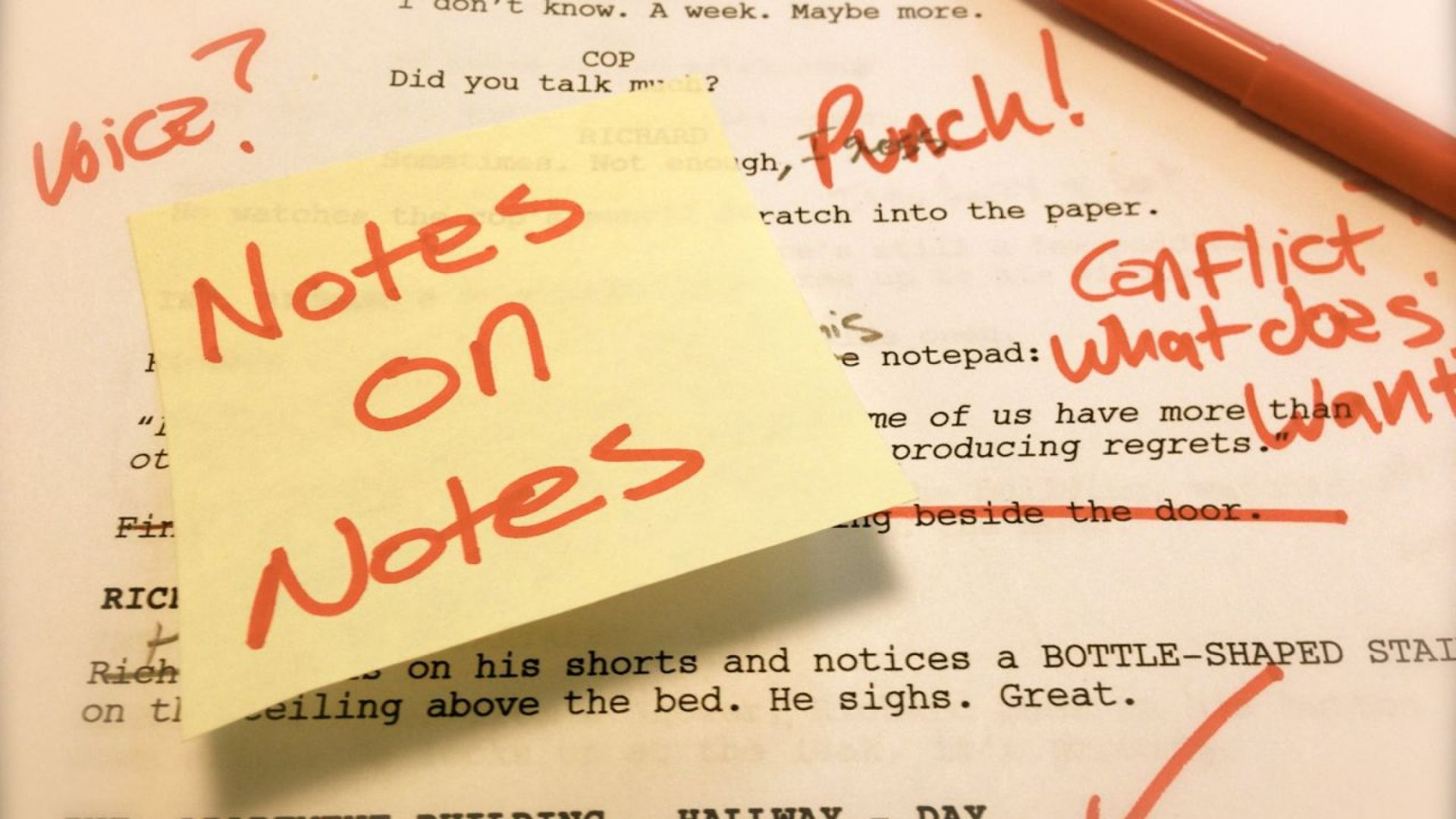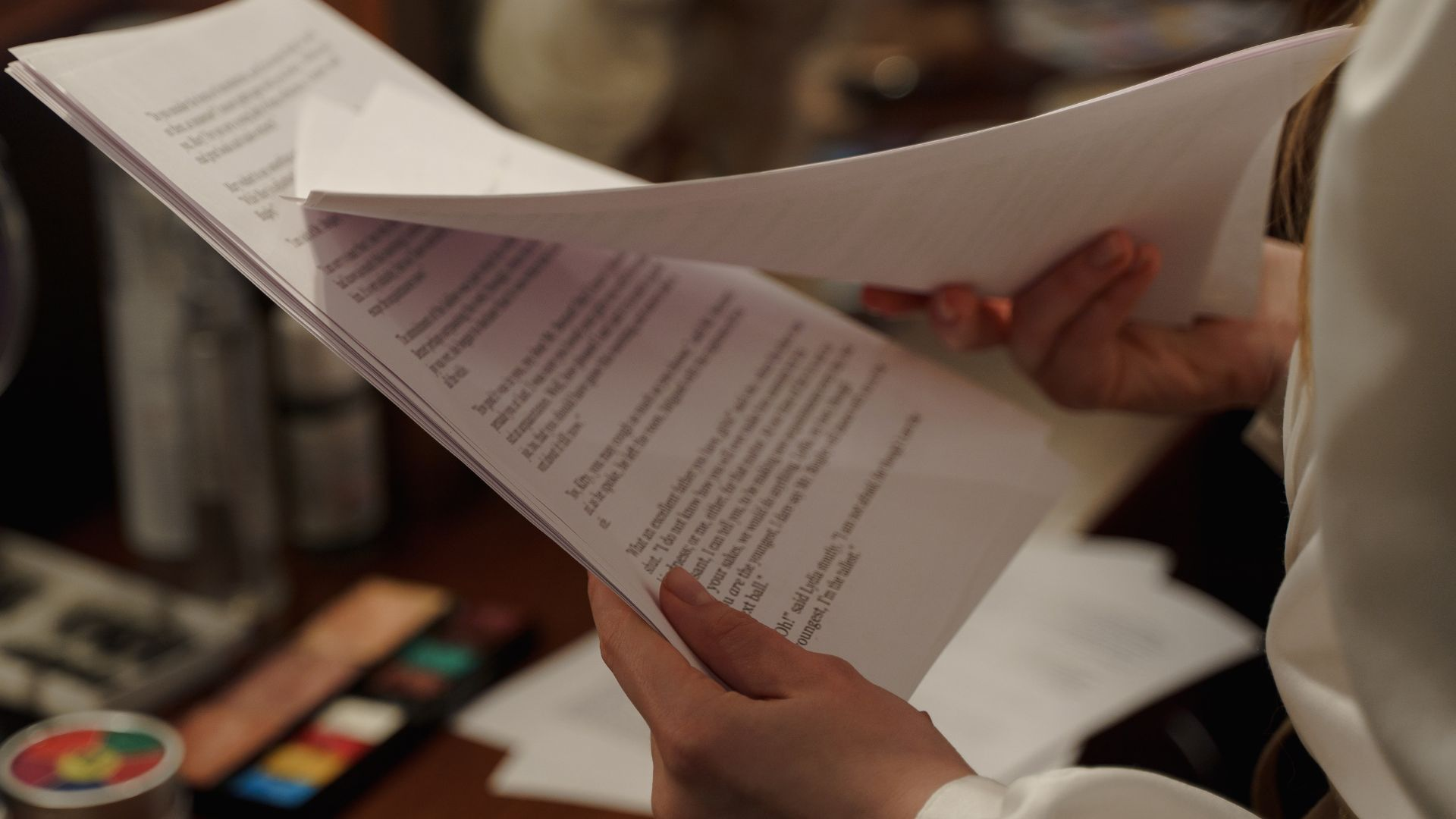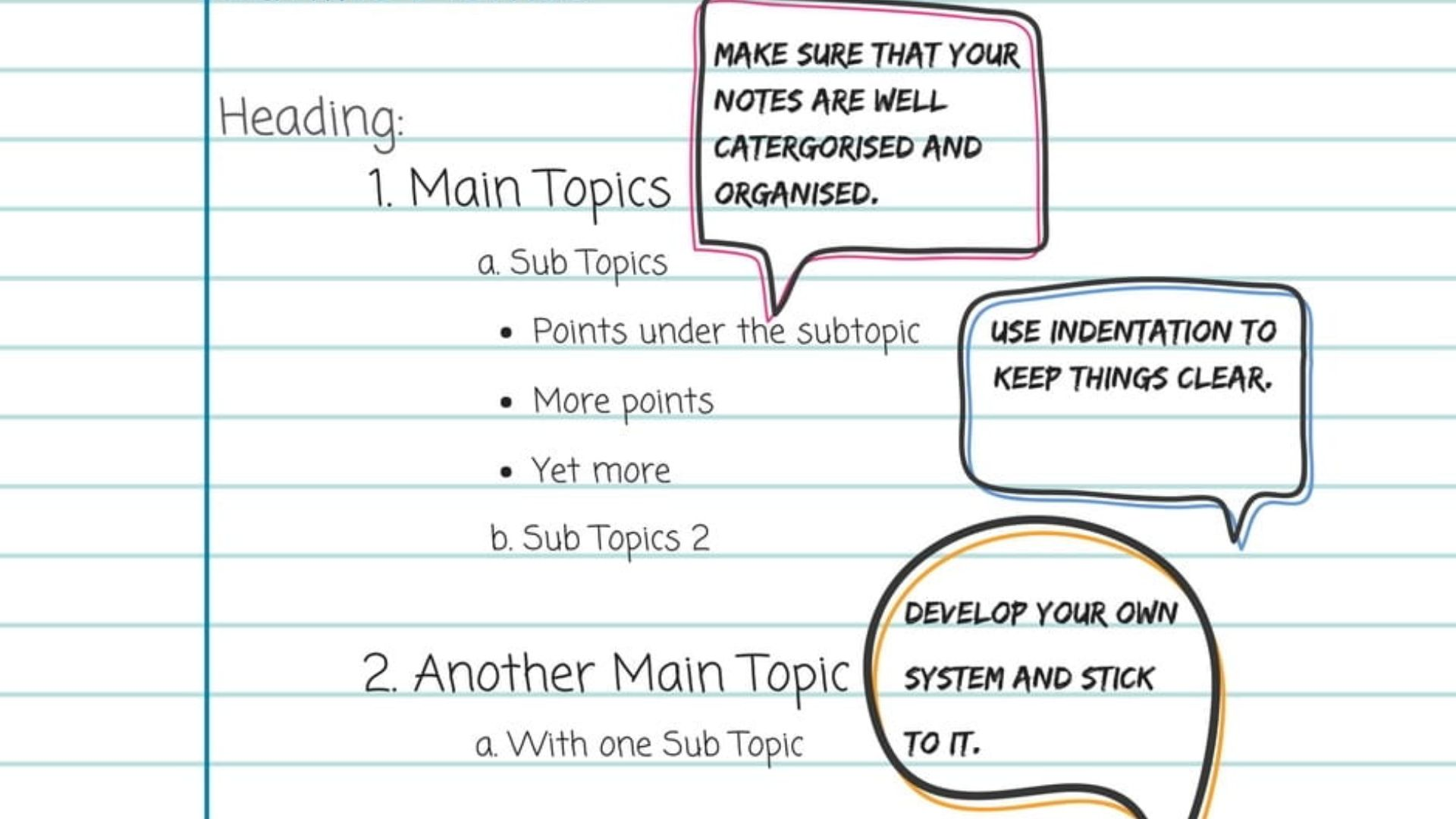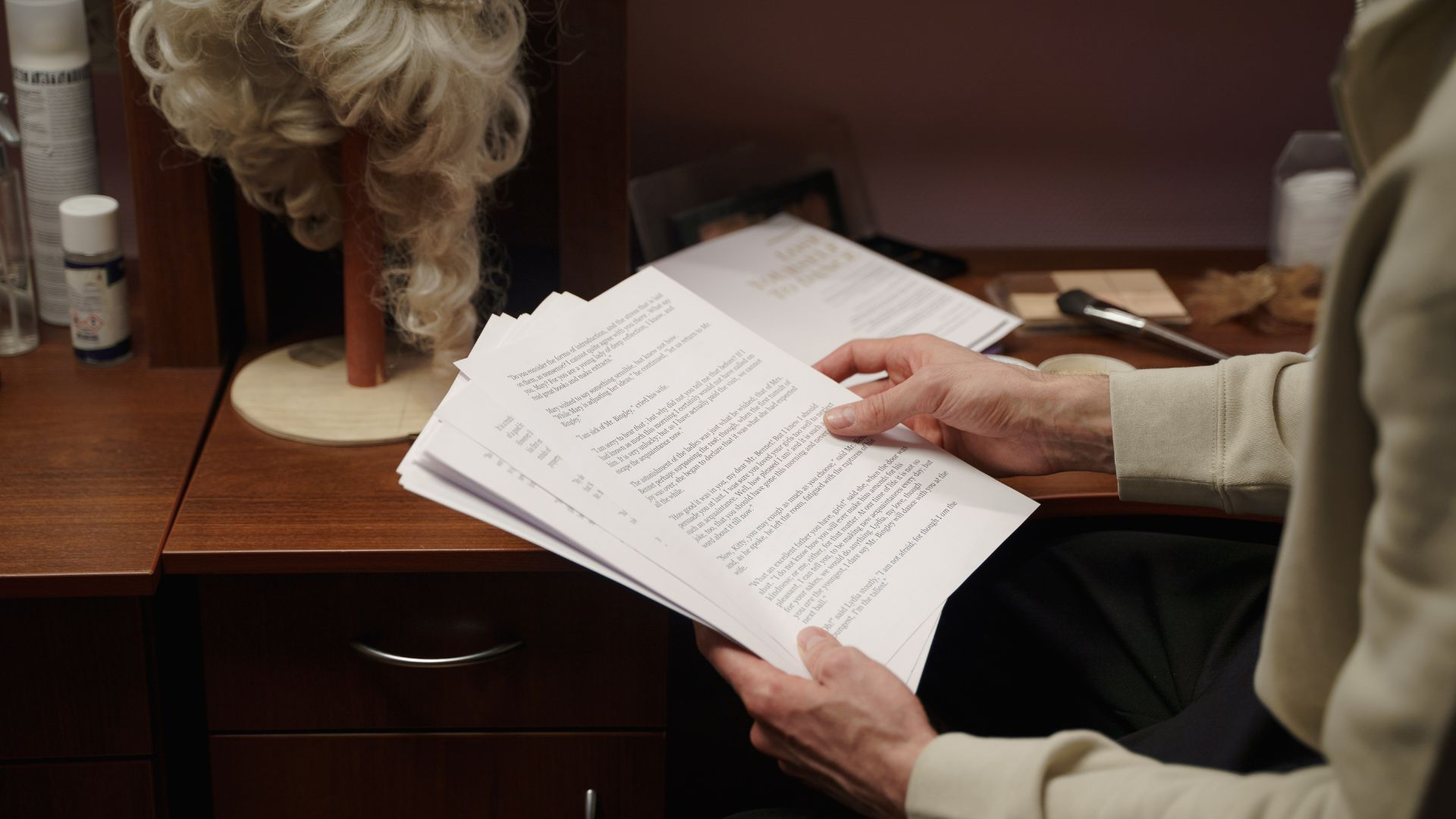You have a brilliant idea in mind, but as soon as you start talking, you find yourself rambling, losing track of your main points, and ultimately leaving your audience confused. Frustrating, right? That’s why you need a good podcast outline template.
Every podcast relies on an engaging podcast script that serves as the backbone of your episodes. Whether you’re hosting an interview-style show, a scripted fiction series, or a conversational podcast, having a solid script template is essential to ensure a smooth and engaging listening experience.
I’m Niall Mackay – creator of A Vietnam Podcast, Did That Really Happen?, Smarter Podcasting and host, producer and editor of many more.
As an experienced podcaster, I understand the importance of good preparation for a successful podcast. And I’m here to share with you my tips on how to write a podcast script that engages your podcast listeners, including key components of a good podcast script, tips for structuring your content, and free podcast script templates.

The Importance Of Podcast Scripts
Have you ever listened to a podcast that felt scattered and disorganized? Maybe the host seemed unsure of what to say next or went off on tangents that left you feeling confused. If you’ve experienced this, you understand the importance of a well-structured podcast script outline.
The reasons it’s important to write a podcast script:
Organization and Structure
A podcast script outline serves as your compass, guiding you through each episode. It ensures that your ideas are organized, your content flows smoothly, and your main points are covered.
By organizing your thoughts in advance, you can avoid rambling or getting off track during recording, resulting in a more coherent and engaging episode.
Time Efficiency
Time is of the essence in podcasting. With a script outline, you save valuable time by having a roadmap of what to say and when to say it. You’ll avoid rambling or getting lost in tangents, allowing you to deliver concise, focused episodes that respect your listeners’ time.
By outlining the different sections or segments of your episode in the podcast script, you can allocate specific time durations to each. This ensures that you cover all the essential points within the given timeframe.
Moreover, you can rehearse the episode before recording. This gives you an opportunity to gauge the timing and make any necessary adjustments.
Content Consistency
Consistency is key to building a loyal audience. A podcast script outline helps you maintain a consistent tone, style, and level of expertise throughout your episodes. It ensures that your brand voice remains strong and resonates with your listeners, creating a sense of familiarity and trust.
With a solid podcast script in hand, you can set the stage for an exciting next episode. You can tease upcoming topics, cliffhangers, or special guests, creating anticipation and leaving your audience eager to tune in for more.
Improvisation with Purpose
While a podcast script outline provides structure, it also leaves room for spontaneous moments and natural conversation. It allows you to embrace unexpected opportunities or follow interesting tangents while still keeping you on track. With a solid outline, you can balance preparedness with the magic of improvisation.

Post-Production Ease
A well-prepared podcast script outline simplifies the post-production process. By having a clear plan during recording, you minimize the need for extensive editing and reshoots. This saves you time and ensures that your episodes are polished and ready for publication without sacrificing authenticity.
I have a recommendation for editing software, Descript.
Podcast Script Types And Formats
Word-for-Word Script
A Word-for-Word script is a podcast script format that involves writing down every word that the host or speaker will say during the episode, just like a podcast transcript.
A Word-for-Word script is a highly structured and detailed approach to podcast scripting. It is ideal for beginners, helps ensure comprehensive coverage, reduces mistakes, and gives the host control over the content and delivery.
While it requires careful preparation and practice, a Word-for-Word script can result in a polished and professional podcast episode.
This type of podcast script is suitable for:
- Narrative Storytelling Podcasts
Podcasts that involve storytelling, whether fictional or based on real-life events, can benefit from a Word-for-Word script. Crafting compelling narratives requires careful planning and attention to detail. Having a detailed script helps the host structure the story, establish the desired pacing, and maintain consistency in the storytelling approach.
- Technical or Instructional Podcasts
These podcasts require precise and accurate explanations to ensure that listeners can follow instructions correctly. The script helps the host deliver information in a clear and concise manner, reducing the chances of confusion or misinterpretation.
- Educational Podcasts
These podcasts need accurate information delivery, clear explanations, and well-structured content. Having a script ensures that the host can present the material in a systematic and organized manner, making it easier for listeners to follow along and grasp the concepts being discussed.

Planned Script
A Planned Script is a podcast script format that involves outlining the main ideas, a few bullet points and structure of an episode without scripting every word.
It allows for flexibility, improvisation, and authenticity while still providing a clear framework for the host to follow.
Some podcast types can benefit from Planned script:
- Conversational Podcasts
Conversations prioritize the natural flow so you shouldn’t use a word-for-word script
If your podcast revolves around natural conversations between hosts or co-hosts, a Planned Script provides a loose framework to guide the discussion. It helps maintain a coherent flow, ensures important topics are covered, and provides prompts for each participant.
- Interview Podcasts
An Interview podcast that features interviews with guests often benefits from a Planned Script. The host can outline key questions, topics, or main talking points in advance, ensuring they cover the necessary ground while allowing for organic conversation and follow-up questions during the recording.
Narrative Podcast Script
The Narrative Podcast Script format is a powerful tool for podcasts that aim to captivate listeners through storytelling.
They are commonly used in genres such as fiction podcasts, true crime podcasts, historical storytelling podcasts, and scripted audio dramas.
The Narrative Script format often goes hand in hand with meticulous sound design and production. It may include music, sound effects, and carefully timed audio cues to enhance the storytelling experience and create a rich audio atmosphere.

Write A Good Podcast Script- A Step-by-Step Guide
This is a detailed guide to writing a podcast script for beginners who is not familiar with it. If you’re an experienced podcaster, you can simply adapt the techniques and write what’s necessary for your show.
Identify Your Podcast
Knowing your podcast format, podcast topic and content is the first step. It helps you to choose the suitable podcast script format. Then define the topic, episode’s theme, or theme of your podcast episode. What do you want to discuss or explore? Narrow down your focus to ensure your outline remains concise and specific.
The following parts are what to include in your episode script. Remember to estimate the time/timestamps in your podcast script to effectively control the time duration for your whole episode.
Podcast Intro
Here is some information you should include in the script of your podcast intro:
Intro Music
Take note of the timestamps that you want to add music. Communicate with your podcast editor or audio production team to ensure the intro music is appropriately timed and integrated during post-production.
Podcast Name/ Podcast Title
When crafting the introduction for your podcast script, it’s important to start off by giving a warm welcome to your audience and establishing a connection right from the beginning.
Greet your audience: Begin by extending a friendly greeting to your listeners. This can be as simple as saying:
“Hello,” “Welcome,” or “Hey, everyone!”
Clearly state the your podcast name. Make sure it’s memorable, relevant to your content, and reflective of your brand. For example, you could say:
“You’re listening to ‘The [Podcast Name],’ where we [describe the main focus or theme of your podcast].”
Host (Co-Host) Name
Share your name and a brief background about yourself. This helps establish credibility and builds a connection with your audience. For instance, you could say:
“I’m [Your Name], your host and [mention your expertise or interest in the podcast topic].”
If you have a co-host, take a moment to introduce them as well:
“And joining me today is [Co-Host’s Name], a [mention their expertise or role on the podcast].”
Episode Topic Introduction
This topic introduction gives your audience a preview of what they can expect in the episode. It creates anticipation and sets the stage for the upcoming discussion, piquing the interest of your listeners and keeping them engaged throughout the episode.
“In today’s episode, we’ll discover [briefly describe the main topic or theme of the episode]. We’ll be exploring [mention the specific aspects or subtopics you’ll cover].”
Guest Intro
If you have a guest on your podcast, provide a warm and engaging guest introduction. Share guest name, backgrounds, achievements, and any relevant information that helps establish their credibility and builds anticipation for the insights they’ll bring to the episode.
“And we have a special guest joining us today. [Guest Name] is an expert in [mention their area of expertise or background]. They bring a wealth of knowledge and experience to our conversation.”
Main Talking Points
The main part of your podcast episode, often referred to as the body or the main content, is where you delve into the heart of your topic and engage your listeners.
Outline Main Points
Consider the flow of your episode and how the main points relate to each other. Arrange them in a logical sequence that allows for a smooth progression of ideas.
Provide supporting details for each point: Once you have your main points, flesh them out with supporting information, examples, statistics, or anecdotes that help illustrate and reinforce your ideas.
You can use bullet points or any format that you are familiar with. You can say:
“In today’s episode, we’ll cover…”
“Let’s jump into our main talking points.”
State your topics by saying
First, we’ll discuss [Briefly describe the first main point]
- Topic 1
Sub-topics
Supporting points
“Then, we’ll move on to [Briefly describe the second main point].”
- Topic 2
Sub-topics
Supporting points
“And finally, we’ll explore [Briefly describe the third main point].”
…

Transition
Transitions play a crucial role in maintaining the flow and coherence of your podcast episode. Remember to write transition phrases to inform your listeners about the next point and create a seamless listening experience.
- Sequential Transitions:
“Next up, let’s explore…”
“Moving on to our next point…”
“Now that we’ve discussed [previous point], let’s shift our focus to…”
- Causal Transitions:
“As a result of [previous point], it leads us to…”
“Building upon what we discussed earlier, this leads us to the question of…”
“Considering the impact of [previous point], it naturally leads us to…”
- Comparative Transitions:
“Similarly, another important aspect to consider is…”
“In contrast to [previous point], let’s now examine…”
“While [previous point] focused on…, let’s now look at a different perspective…”
Breaks
Breaks serve as natural pauses within the episode that provide the audience with a moment to process the information and reset their attention.
When you have a podcast network, you can insert the sponsor message between the breaks. You can say something like:
“Now, let’s take a short break to hear a word from our sponsor.”
“Before we continue, let’s pause for a moment and thank our sponsor.”
And when you come back:
“Now, let’s dive back into our conversation”
“We’re back, and we were just talking about…”

Podcast Outro
The podcast outro section is the closing part of your episode where you wrap things up and provide a conclusion.
Key takeaways
“As we wrap up today’s episode, let’s recap what we’ve learned. We discussed [summarize the main points briefly]”
Call to action
Remind listeners to subscribe, follow or take a specific action related to the episode’s topic. It could be subscribing to your podcast, leaving a review, visiting your website, or engaging with you on social media. Make it clear and compelling.
“Don’t forget to [mention the specific call to action, such as subscribing, leaving a review, or visiting your website]. Your support means the world to us!”
Upcoming episodes
Provide a sneak peek or teaser of what’s coming up in future episodes. This helps to build anticipation and keeps your audience engaged. You can say:
“Stay tuned for future episodes where we’ll be exploring [Mention next episode’s topic or guests you have planned]. You won’t want to miss it!”
Sponsor message
It’s important to ensure that the sponsor message is clearly distinguishable from the rest of the content, either through a brief pause, a different tone of voice, or a transition statement like:
“And now, a word from our sponsor.”
The specific placement can vary depending on the podcast formats and styles.
“This episode of [Podcast Name] is brought to you by [Sponsor Name]. [Briefly describe the sponsor’s product, service, or message].
As a listener of our podcast, you can take advantage of a special offer. Just visit [Sponsor Website or Promo Code] to [mention the specific benefit or discount]. We’re grateful to [Sponsor Name] for their support in making this episode possible.”

Outro music
Outro music is the music that plays at the end of your podcast episode, signaling its conclusion and leaving a lasting impression on your listeners. It serves as a way to wrap up the episode and create a sense of closure.
Aim for a duration of around 10 to 30 seconds, depending on the pacing and your podcast flow. Remember to maintain consistency with your intro music across episodes to create a sense of familiarity and brand identity. It helps in building a connection with your audience and makes your podcast easily recognizable.
Own your own Podcast music from Lewis Wright at Seven Million Bikes Podcasts.
Good Podcast Script Template
Choosing a suitable podcast script template can provide structure and guidance, especially for beginners. It helps ensure that you cover all the necessary elements and maintain a cohesive flow throughout your episodes. Templates serve as a helpful starting point, saving you time and effort in organizing your thoughts and ideas.
When selecting a template, consider the format and style of your podcast. If it’s an interview-based podcast, opt for a template that includes sections for introductions, questions, and transitions. For a solo podcast, look for a template that allows you to outline the main ideas, examples, and conclusions.
If you want to explore deeper about a good podcast outline template, enroll in my course here.
Here is a podcast script template for the Interview podcast:
[Intro music]
Intro:
Host: Welcome to [Podcast Name], the show where we dive deep into conversations with inspiring guests from [industry/field]. I’m your host, [Host Name], and today I’m thrilled to have [Guest Name] joining us. [Briefly introduce the guest and their expertise.]
If you’re new here, make sure to hit that subscribe button so you don’t miss any of our future episodes!
Question 1:
Host: Let’s start by learning more about your background and journey. How did you get started in [field/industry]? [Allow the guest to share their story.]
Transition into…
Question 2:
Host: Building on your experience, I’d love to delve into [specific topic or aspect related to guest’s expertise]. How has [topic] influenced your work? [Engage in a conversation with the guest, asking follow-up questions and encouraging their insights.]
Mid Break:
[Break during the episode which includes a sponsor message or a call-to-action.]
Question 3:
Host: Now, let’s shift gears and discuss [another relevant topic or aspect]. In your opinion, what are the key challenges faced by [industry/field] today? [Encourage the guest to share their thoughts and provide valuable insights.]
Question 4:
Host: I’m curious to know your thoughts on [specific trend or development]. How do you see it shaping the future of [industry/field]? [Engage in a discussion, allowing the guest to share their perspectives and predictions.]
Outro:
Host: That wraps up our conversation for today. I want to extend a huge thank you to [Guest Name] for sharing their valuable insights with us. Make sure to connect with them on [preferred platforms] to learn more about their work.
If you enjoyed this episode, please consider leaving us a review on [Podcast platform]. Your feedback helps us grow and improve!
Until next time, keep exploring, learning, and embracing the possibilities.
[Outro music]
Remember, templates are flexible, and you can customize them to fit your unique podcasting style and content. Adapt the template by adding or removing sections, modifying the language to match your tone, and incorporating your personal flair.
As you gain more experience, you may even develop your own personalized podcast script format that aligns with your specific needs and preferences.
Good Podcast Outline Template-A Few Tips
Be clear and concise
Keep your language clear, concise, and easy to understand. Use short sentences and avoid jargon or complex terminology unless necessary. Remember, your goal is to engage and connect with your audience, so make your content accessible to a wide range of listeners.
Use a conversational tone
Write your podcast script in a conversational tone that reflects your podcast’s style and personality. Imagine you’re having a casual conversation with a friend. This approach helps create a more relatable and engaging listening experience.
Storytelling can captivate your audience and make your podcast more memorable. Find opportunities to incorporate relevant anecdotes, examples, or personal experiences that illustrate your main points. This helps to create a deeper connection with your listeners.
Practice effective transitions
Smooth transitions between topics or segments can enhance the flow of your episode. Use transitional phrases or cues to signal a shift in focus, introduce new ideas, or summarize key takeaways. This keeps your listeners engaged and helps them follow the progression of your content.

Highlight key points with emphasis
Indicate specific areas where you want to emphasize certain words or phrases, or where you want to change the tone of your voice. This helps you convey the intended emotion or emphasis during recording.
Use formatting techniques, such as bold or italic text, to highlight important keywords or phrases in your script. This helps you emphasize critical points during recording and ensures they stand out to your listeners.
Incorporate pauses and pacing
Integrate natural pauses and pacing into your podcast script. This allows for moments of reflection, lets important information sink in, and helps break up long stretches of talking. Pauses also give you a chance to transition smoothly between topics.
If you plan to include breaks or mid-roll sponsor messages, mark the appropriate spots in your script. This ensures you take planned breaks and seamlessly incorporate sponsor messages into the episode.

Practice and revise
Once you have written your script, practice reading it aloud several times. Pay attention to the flow, clarity, and timing. Revise and refine as needed to ensure your script sounds natural and polished.
Be flexible and adaptable: While having a podcast script is important, remember to be flexible and open to improvisation. Allow for organic conversations and follow interesting tangents that arise during recording. A script should guide you, but not restrict you from exploring engaging discussions with your guests or co-hosts.
Podcast Outline Template Overview
With the instructions provided above, I hope you feel equipped and empowered to create your very own podcast script.
A podcast script serves as your roadmap, guiding you through the episode and helping you stay on track. It allows you to organize your thoughts, outline key points, and incorporate smooth transitions. With a script in hand, you feel more confident and prepared, reducing the chances of stumbling or going off-topic during recording.
While having a script is crucial, remember to allow for flexibility and spontaneity. Embrace the natural flow of conversation and be open to unexpected twists and turns. A script is a tool to guide you, but it should never restrict your creativity or authenticity.
Your unique voice, combined with a well-crafted script, will captivate your audience and keep them coming back for more.


